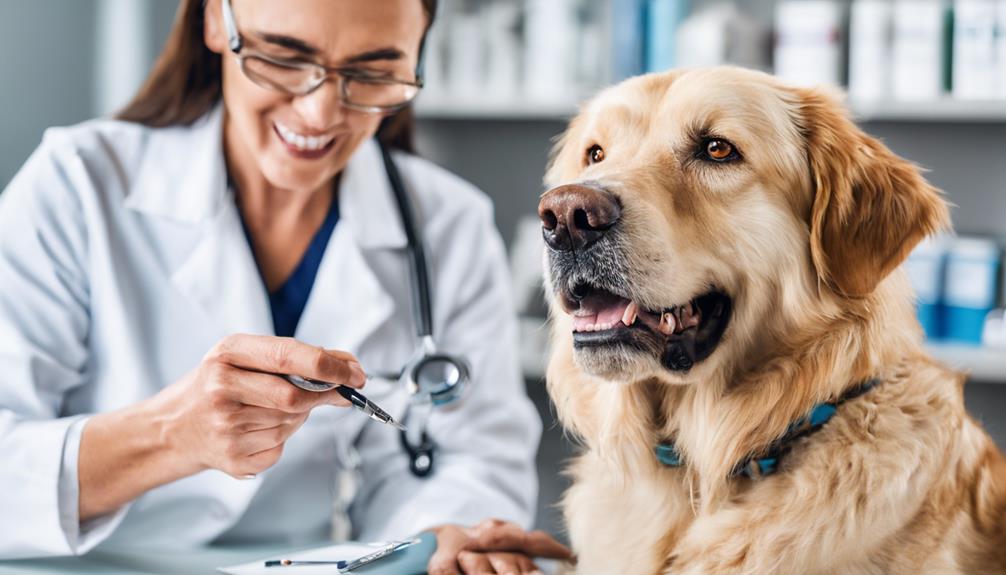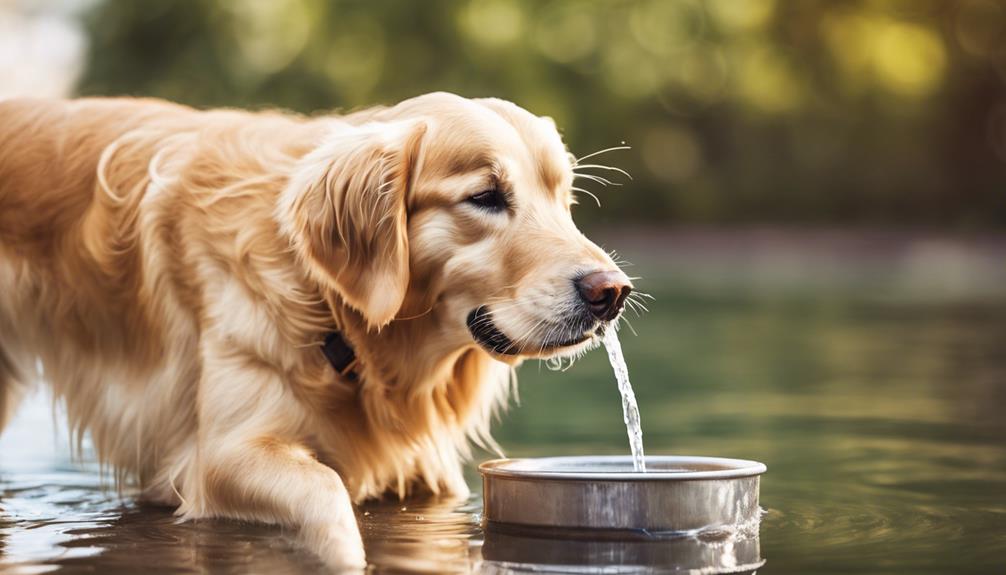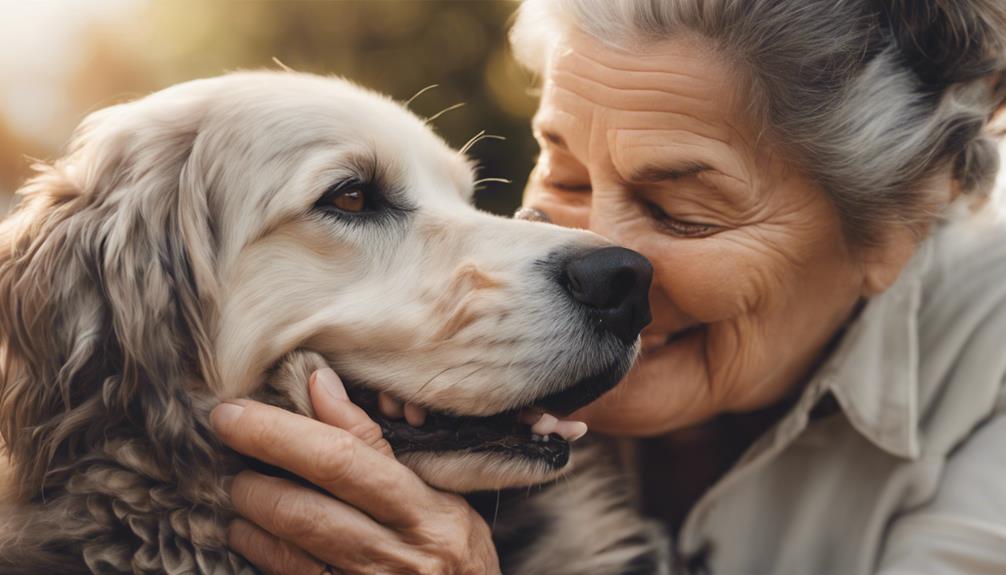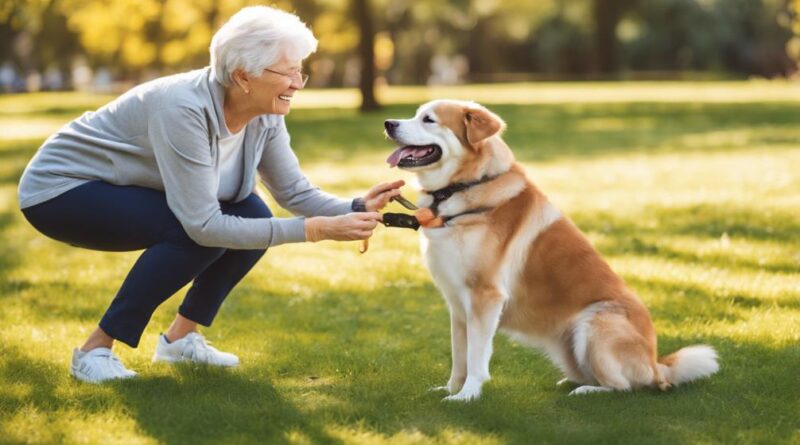13 Essential Tips to Prolong Your Dog's Life
To prolong your dog's life, prioritize regular vet check-ups for early detection, feed a balanced diet, and ensure daily exercise for vitality. Maintain a healthy weight through proper diet and exercise, emphasize dental care, and offer quality rest for optimal health. Regular grooming and a safe environment are key for well-being. Shower your pup with love and affection. Remember, these are just the essentials; there's more to learn about keeping your furry friend healthy and happy.
Regular Veterinary Check-ups
Regular veterinary check-ups are essential for maintaining your dog's health and detecting any potential issues early on. Preventative care is crucial in ensuring your furry companion lives a long and healthy life. Wellness exams play a key role in this preventive approach by allowing veterinarians to assess your dog's overall health and catch any problems before they escalate.
During wellness exams, your veterinarian will conduct a thorough physical examination of your dog. This includes checking your dog's weight, listening to their heart and lungs, examining their eyes, ears, and teeth, and feeling for any lumps or abnormalities. These routine check-ups can help identify underlying health issues that may not be apparent to you as a pet owner.
In addition to the physical exam, wellness exams often include preventive measures such as vaccinations, parasite control, and screenings for common diseases. These proactive steps can help protect your dog from various illnesses and ensure they're up to date on essential vaccinations.
Balanced Diet and Nutrition
Maintaining a balanced diet and proper nutrition is essential for enhancing your dog's overall health and longevity. Nutritional supplements can be beneficial in ensuring your furry companion receives all necessary vitamins and minerals. However, it's crucial to consult with your veterinarian before introducing any supplements to your dog's diet to prevent any adverse effects.
Weight management plays a key role in your dog's well-being. Obesity can lead to various health issues such as diabetes, joint problems, and heart disease. Ensure you're feeding your dog appropriately portioned meals and engaging in regular exercise to help them maintain a healthy weight.
When it comes to feeding your dog, consider incorporating homemade diets into their meal plan. This allows you to have better control over the ingredients and ensures the quality of the food they consume. Additionally, establishing a feeding schedule and sticking to it can help regulate your dog's digestion and prevent overeating.
Daily Exercise Routine
To ensure your dog's vitality and well-being, incorporating a daily exercise routine is crucial. Daily exercise isn't only beneficial for your dog's physical health but also contributes significantly to their mental stimulation and overall happiness. Interactive toys and training sessions are excellent ways to engage your dog both mentally and physically. These activities help prevent boredom, reduce destructive behaviors, and strengthen the bond between you and your furry companion.
Outdoor adventures are another fantastic way to keep your dog active and stimulated. Taking your dog for walks in different environments, such as parks or hiking trails, provides them with new sensory experiences and mental enrichment. Additionally, outdoor activities like fetch or agility training can help improve your dog's agility, coordination, and responsiveness.
Enrichment activities are also key components of a well-rounded exercise routine. Consider setting up scavenger hunts in your backyard, using puzzle feeders, or teaching your dog new tricks. These activities not only provide physical exercise but also challenge your dog's cognitive abilities, keeping their mind sharp and engaged.
Maintain Healthy Weight
Achieving and maintaining a healthy weight for your dog is essential for their overall well-being and longevity. Just like in humans, obesity in dogs can lead to various health issues such as diabetes, heart disease, and joint problems. Here are some essential tips to help your furry friend stay at a healthy weight:
- Proper Hydration: Make sure your dog has access to fresh water at all times. Proper hydration is crucial for overall health and can aid in weight management by supporting digestion and metabolism.
- Balanced Diet: Feed your dog a balanced diet that's appropriate for their age, breed, and size. Avoid excessive treats and table scraps, as they can contribute to weight gain.
- Regular Exercise: Along with proper nutrition, regular exercise is key to maintaining a healthy weight. Take your dog for daily walks, play fetch, or engage in other physical activities they enjoy.
- Portion Control: Be mindful of portion sizes when feeding your dog. Use a measuring cup to ensure you aren't overfeeding. If you're unsure about the right amount to feed, consult your veterinarian for guidance.
Dental Care Importance
Ensuring proper dental care for your dog is crucial for their overall health and quality of life. Just like humans, dogs can suffer from dental issues such as tartar buildup, gum disease, and tooth decay. To prevent these problems, regular brushing is essential. Use a dog-specific toothbrush and toothpaste to brush your dog's teeth at least 2-3 times a week. Start by gently introducing your dog to the brushing routine, gradually increasing the time as they get more comfortable. Proper brushing technique is crucial; be sure to focus on the gum line and back teeth where plaque tends to accumulate.
In addition to brushing, dental treats and chew toys can also help maintain your dog's oral health. Dental treats are designed to reduce plaque and tartar buildup, while chew toys can help keep your dog's teeth clean by reducing plaque through the chewing action. It's important to choose dental treats and chew toys that are appropriate for your dog's size and chewing habits.
While at-home dental care is important, professional cleanings are also necessary. Your veterinarian can perform thorough cleanings to remove any tartar or plaque that regular brushing may have missed. Aim to schedule professional cleanings at least once a year to ensure your dog's teeth and gums are in top condition. By implementing a comprehensive dental care routine, you can help your dog maintain a healthy smile and overall well-being for years to come.
Mental Stimulation Activities
Proper dental care sets the foundation for your dog's overall well-being, and now let's explore engaging Mental Stimulation Activities to enhance their quality of life. Mental stimulation is crucial for your dog's cognitive health and emotional well-being. Here are some activities to keep your furry friend sharp and content:
- Interactive Toys: Invest in interactive toys that dispense treats when manipulated. These toys not only provide mental stimulation but also keep your dog physically active. Puzzle toys are great options to challenge your dog's problem-solving skills.
- Brain Games: Engage your dog in brain games such as hide-and-seek with treats or toys. This not only exercises their brain but also strengthens the bond between you and your pet. You can also try teaching them new tricks to keep their mind sharp.
- Sensory Activities: Create sensory experiences by introducing new scents, textures, and sounds. Take your dog for outdoor adventures where they can explore different environments and stimuli. This helps in keeping their senses sharp and engaged.
- Training Sessions: Regular training sessions are a fantastic way to provide mental stimulation. Teach your dog obedience commands, agility courses, or even enroll them in advanced training classes to challenge their intellect and keep them mentally active.
Senior Dog Wellness Checks

Regular wellness checks for your senior dog are essential to monitor their health and address any age-related concerns proactively. As dogs age, they're more prone to various health issues, making these check-ups crucial in maintaining their well-being. During these visits, the veterinarian will assess your dog's overall health, provide vaccinations if needed, and conduct screenings for common senior dog ailments such as arthritis, dental problems, and vision or hearing loss.
In addition to regular vet visits, holistic care can play a significant role in keeping your senior dog healthy and happy. Holistic practices like acupuncture, massage therapy, or herbal supplements can help alleviate pain, improve mobility, and enhance your dog's quality of life in their golden years. These complementary therapies can work alongside traditional veterinary care to address your senior dog's specific needs.
As your dog ages, you may also consider incorporating mobility aids to assist them in moving around comfortably. Products like orthopedic beds, ramps, or joint supplements can help alleviate joint pain and make daily activities easier for your senior pup. It's essential to adapt your home environment to cater to your dog's changing needs and ensure they can navigate their surroundings safely.
Preventive Flea and Tick Treatment
To maintain your senior dog's overall health and well-being, it's important to prioritize preventive flea and tick treatment throughout their golden years. Fleas and ticks can't only be irritating for your furry companion but can also lead to more serious health issues if left untreated. Here are some essential tips for effective parasite prevention:
- Regular Veterinary Check-ups: Schedule regular check-ups with your veterinarian to discuss the best flea and tick prevention methods suitable for your senior dog's health status.
- Prescription Preventive Medications: Your vet may recommend prescription flea and tick preventive medications tailored to your dog's specific needs. These are highly effective in keeping parasites at bay.
- Natural Remedies: Explore natural remedies such as essential oils or herbal sprays that can act as a supplementary preventive measure. However, always consult your vet before using any natural treatments to ensure they're safe for your dog.
- Environmental Maintenance: Keep your living spaces clean and well-maintained to reduce the risk of flea and tick infestations. Regularly wash your dog's bedding and vacuum areas where they spend time indoors.
Hydration Is Key

Staying adequately hydrated is vital for maintaining your senior dog's health and vitality as they age. Water consumption plays a crucial role in ensuring your furry companion's overall well-being. As dogs age, they become more prone to dehydration, making it essential to pay close attention to their hydration needs.
To promote proper hydration, ensure that your senior dog has access to fresh, clean water at all times. Encourage regular water consumption throughout the day, especially after physical activity or on hot days. Monitoring your dog's water intake can help you identify any changes in their drinking habits, which could indicate underlying health issues.
Hydration tips for senior dogs include adding water to their food to increase moisture content and flavor. You can also consider incorporating wet food into their diet to boost their water intake. Additionally, investing in a pet fountain may encourage your dog to drink more water, as some senior dogs prefer running water.
Quality Rest and Sleep
Maintaining proper hydration for your senior dog is crucial for their health, and now let's address the importance of quality rest and sleep in prolonging your furry companion's life.
Quality rest and sleep play a vital role in your dog's overall well-being. Ensuring that your senior dog gets sufficient and good-quality sleep can significantly impact their health and longevity. Here are some essential tips to help your dog get the rest they need:
- Establish a Routine: Dogs thrive on routine, so try to create a consistent sleep schedule for your furry friend. Going to bed and waking up at the same time every day can help regulate their internal clock and improve the quality of their sleep.
- Create a Comfortable Sleeping Environment: Make sure your dog has a cozy and quiet place to rest. Consider providing a comfortable bed in a peaceful area of your home where they can relax without disturbances.
- Promote Sleep Hygiene: Just like humans, dogs benefit from good sleep hygiene. Keep their sleeping area clean and free of any potential irritants that could disrupt their sleep.
- Encourage Nap Schedules: Allowing your senior dog to take short naps throughout the day can help them recharge and maintain their energy levels. Be mindful of their nap durations to ensure they still get a full night's rest.
Regular Grooming Practices

Regular grooming is essential for keeping your senior dog healthy and comfortable. Proper coat maintenance is crucial in preventing matting and skin issues. Brush your dog's coat regularly to remove tangles, dirt, and loose fur. This not only keeps your dog looking good but also allows for better air circulation to the skin. Additionally, regular grooming sessions give you the opportunity to check for any abnormalities such as lumps, ticks, or fleas.
Shedding control is another important aspect of grooming for senior dogs. As dogs age, their coat may change, and they may shed more frequently. Regular brushing helps to remove loose fur, reducing the amount of hair left around your home and minimizing the risk of hairballs or matting. This practice is especially crucial for breeds with longer or thicker coats.
In addition to brushing, don't forget about other grooming tasks such as nail trimming, ear cleaning, and dental care. Keeping up with these routines can help prevent infections and discomfort for your senior dog. If you're unsure about how to groom your dog properly, consider seeking advice from a professional groomer or your veterinarian. By staying on top of regular grooming practices, you can contribute to your dog's overall well-being and quality of life.
Environmental Safety Measures
To ensure your senior dog's safety and well-being, implementing environmental safety measures is paramount as they age. As your furry companion enters their golden years, being mindful of indoor hazards and outdoor toxins can significantly contribute to prolonging their life and maintaining their health.
Environmental Safety Measures for Your Senior Dog:
- Secure Hazardous Areas: As your dog ages, their mobility and vision may decline. Ensure that areas with potential dangers such as stairs, balconies, or swimming pools are secure to prevent accidents.
- Toxic Plants and Chemicals: Keep toxic plants like lilies, azaleas, and daffodils out of reach. Be cautious with pesticides, fertilizers, and other chemicals in your yard or home that could harm your senior dog.
- Temperature Regulation: Older dogs are more sensitive to extreme temperatures. Provide adequate shelter, cooling options in hot weather, and warmth during colder months to keep them comfortable.
- Regular Vet Check-ups: Schedule regular visits to the vet to monitor your senior dog's health and catch any potential issues early. This is crucial for maintaining their well-being and addressing any age-related concerns promptly.
Love and Affection Matters

Ensuring your senior dog feels loved and cherished plays a crucial role in their overall well-being and quality of life. Bonding activities are essential in fostering a strong connection between you and your furry companion. Engaging in activities such as daily walks, playtime, grooming sessions, and training not only strengthens your bond but also provides mental stimulation for your dog. These interactions are vital for maintaining their emotional well-being and happiness.
In addition to bonding activities, providing emotional support is equally important. Your dog may experience anxiety or stress as they age, and your love and affection can help alleviate these feelings. Spending quality time together, offering comforting gestures, and creating a safe and secure environment are ways to show your senior dog that they're loved and valued.
Frequently Asked Questions
Can Specific Dog Breeds Live Longer With Proper Care?
Certain dog breeds can indeed live longer with proper care. Breed-specific longevity is influenced by factors such as genetics, size, and predisposition to certain health conditions.
By understanding these breed-specific characteristics, you can tailor your care to promote a longer, healthier life for your furry companion.
Regular vet check-ups, a balanced diet, exercise, and mental stimulation all play crucial roles in ensuring the well-being and longevity of your beloved pet.
How Can I Protect My Dog From Common Household Hazards?
To protect your dog from common household hazards, consider outdoor toxins and pet proofing techniques. Keep harmful chemicals, medications, and plants out of reach. Secure trash cans to prevent scavenging. Use pet-safe cleaning products.
Be cautious with electrical cords and small objects that can be ingested. Install gates to block off dangerous areas. Regularly check your home for potential hazards and address them promptly to keep your furry friend safe and healthy.
Are There Age-Specific Activities to Promote Longevity?
To promote longevity in your dog, consider age-specific activities. Tailoring exercise routines can help maintain their physical health, while mental stimulation keeps their mind sharp.
For younger dogs, focus on activities that build strength and endurance. As your dog ages, adjust exercises to be gentler and more low-impact. Engaging your dog's mind with puzzles and interactive toys can also contribute to their overall well-being and longevity.
What Signs Indicate It's Time to Adjust My Dog's Diet?
When adjusting your dog's diet, monitor for signs like weight fluctuations, digestive issues, dull coat, or low energy levels. These could signal nutrient deficiencies, prompting the need for dietary supplements or a change in food.
Consult with your vet to pinpoint the cause and make appropriate adjustments. Maintaining a balanced diet is crucial for your dog's well-being and longevity.
Treat their nutrition with care to support a healthy and happy life.
How Can I Ensure My Senior Dog Stays Mentally Sharp?
To ensure your senior dog stays mentally sharp, engage them in brain games, enrichment activities, and cognitive training. Introducing puzzles and interactive toys can help stimulate their mind and prevent cognitive decline.
Regular mental exercise is crucial for maintaining your dog's cognitive functions as they age. Keep their brain active with various activities to promote mental sharpness and overall well-being in their golden years.
Conclusion
In conclusion, by following these 13 essential tips to prolong your dog's life, you can ensure that your furry friend lives a long and healthy life.
Remember to prioritize regular veterinary check-ups, provide a balanced diet, maintain a daily exercise routine, and show your dog love and affection.
By taking care of your dog's physical and emotional well-being, you're setting them up for a happy and fulfilling life by your side.
